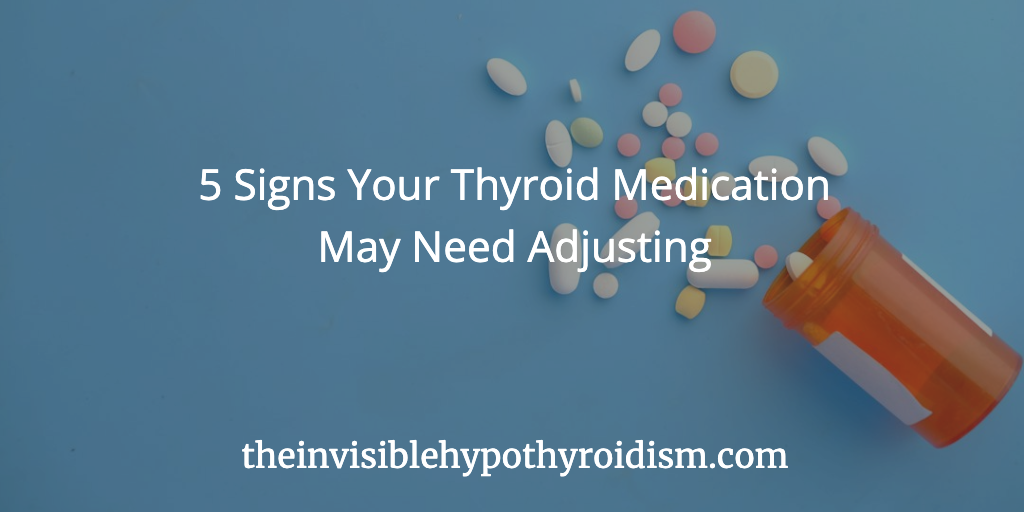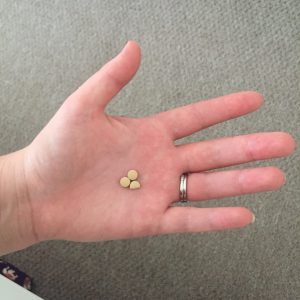Originally published on 9th March 2021 Last updated on 26th February 2024
It is quite unusual for thyroid medication type and dosage to stay static for the whole time you are taking it. Even when we’re first started on thyroid medication, it is often adjusted and tweaked until we find the right amount to alleviate hypothyroid symptoms.
Here’s an excerpt taken from the book ‘You, Me and Hypothyroidism’ :
Something I didn’t realise until we were well into Rachel’s thyroid journey is how thyroid medication can change over time. I soon adapted to not expect the type of medication or even the dosage, to stay the same forever. Being fixed on the same dose of thyroid medication for life is unusual. As a result, hypothyroidism needs to be monitored and kept on top of and with this can come changes in dosage, but also type of medication, if the one they’re on just doesn’t seem to be helping anymore.
The type of medication and dosage your loved one is put on initially probably won’t be the same ten years down the line, after a big flare up in their health or even during or after a pregnancy…
Has your loved one been particularly tired recently? Without changing their routine or what is ‘normal’? This can be a sign that their thyroid levels and medication may need a review.
What Can Cause a Change in Dosage or Type of Medication?
Thyroid function can fluctuate and often does over time. External factors such as a change in temperature (going from warmer to colder months and vice versa) can affect how much thyroid hormone replacement we need, as can ageing, changes in our weight, stress levels and pregnancy. A healthy thyroid gland can adapt to produce more or less thyroid hormone, depending on what the person needs, but when we manually input thyroid hormone via medication due to a faulty thyroid gland, we don’t have this benefit.
See: Why Do Some of us Need More Thyroid Medication in Colder Months?
and: Why Do Some of us Need Less Thyroid Medication in Warmer Months?
When it comes to a change in type of thyroid medication, you may start to notice that your thyroid medication doesn’t seem to be working as effectively as it used to if old symptoms are returning or you’re collecting new ones. This can be especially common for those on T4 medications such as Levothyroxine or Synthroid, as the ability to convert the storage hormone T4 in to the active thyroid hormone T3, can diminish or worsen overtime. A medication review to include other medication options, such as synthetic T3 medication or Natural Desiccated Thyroid Medication (NDT) can be considered.
Signs Your Thyroid Medication May Need Adjusting
Below are some signs you may need a medication adjustment, whether in type and/or dosage.
Remember that a full thyroid panel is the most accurate way to review thyroid hormone levels and function, and manage a thyroid condition. Including managing medication.
1. You’re Getting Sick More Often
When you are low in thyroid hormone, immune function can be affected. Many thyroid patients state that when they’re not feeling optimally treated for their hypothyroidism, their immune system takes a hit and they start catching bugs, colds and viruses much more often.
2. You’re Feeling Tired All The Time
If you’re still feeling fatigued and unrefreshed after sleep or rest, it’s time to check your thyroid levels again. Often, thyroid fatigue creeps up on us overtime and we start to feel as if we’re always a little tired, which can soon turn in to pure exhaustion.
3. Symptoms Are Mounting Up
There are many recognised symptoms of hypothyroidism, including:
- Tiredness
- Sensitivity to cold or heat
- Weight gain and inability to lose weight
- Constipation
- Depression and anxiety
- Muscle aches, pains and weakness
- Poor appetite
- Dry and tight feeling skin
- Brittle hair and nails
- Loss of libido (sex drive)
- Brain fog
- Migraines/headaches
- Hoarse voice
- Thinned or partly missing eyebrows
- Poor stamina
- The need to nap more than others
- Struggles to exercise
- Acid reflux
- Hair loss
You may have noticed some symptoms creeping back in, or worsening again. Or perhaps you’re experiencing new ones. If so, it’s time to get a thyroid review.
You may also experience symptoms of hyperthyroidism, if your dose actually needs decreasing. Sudden weight loss, heart palpitations and anxiety could indicate this.
4. You’re Experiencing Menstrual Changes
Changes to menstrual cycles, such as in length of cycle, length of period, heaviness of period or frequency/regularity of periods, can all indicate a change in your thyroid hormone levels.
5. You’re Having a Lot of Thyroid Flare Up Days
A thyroid flare up is defined by an increase in symptoms of the thyroid condition, for example, many experience this as a day or two of increased fatigue, flu-like achiness, headaches and brain fog.
A flare up usually lasts for a day or two, so, if they’re going on for longer than this, it may not actually be a flare up, but a permanent dropping of your thyroid hormone levels. After all, flare ups are not associated with a drop in thyroid hormone levels, but are more a reaction to overexertion which takes your body a day or two to recover from.
What signs do you get that you need to review your thyroid medication?
You can click on the hyperlinks in the above post to learn more and see references to information given.






